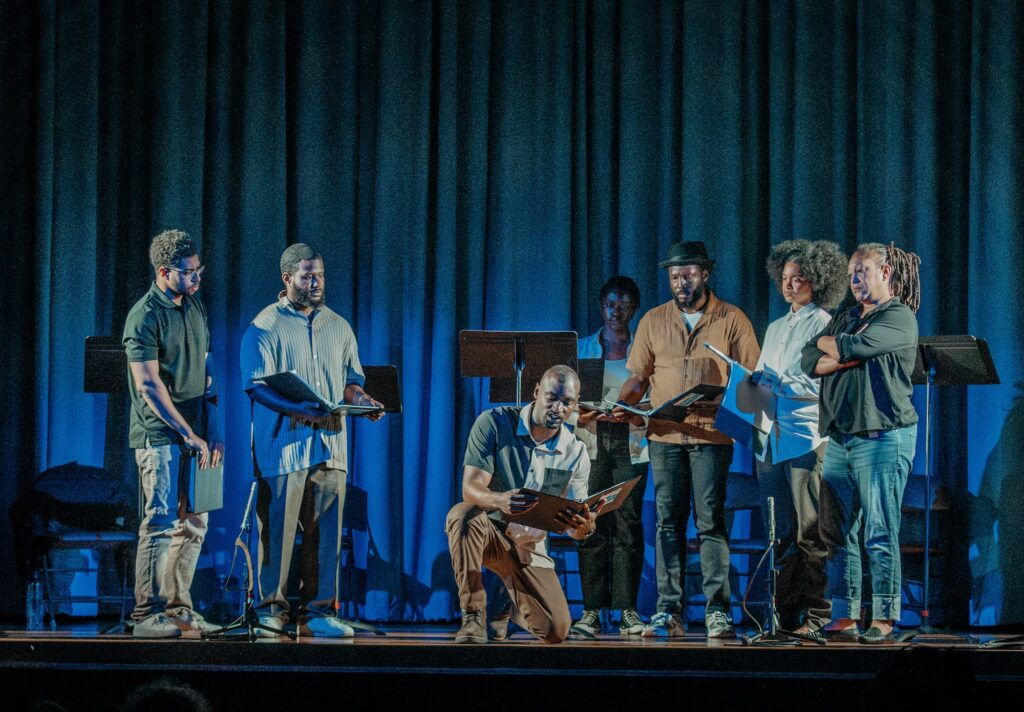Hours before curtain call on Juneteenth evening, writer and director Biko Eisen-Martin double- and triple-checked the setup at Ruth Williams Opera House in the Bayview. 3rd & Palou postcards with scannable programs are straightened on chairs, sound systems checked and rechecked, lighting lit and re-lit.
Martin, a multi-talented artist with a mural in Clarion Alley, controls all he can. Because the seasoned director knows control is the first thing he’ll lose once the stage reading starts.
“I can’t really ask anything of my audience but to show up,” Martin said. “That’s a blessing in and of itself.”
Attending a table reading is especially critical; the reward behind the risk of sharing a work-in-progress is feedback. (“San Franciscans complain there’s nothing to do. Then when you offer something free like this, no one shows up,” one actor worried.)
“You’ll see this as a memory piece,” Martin offered about the work, which dramatizes the 1966 Hunters Point uprising in the wake of the murder of teenager Matthew “Peanut” Johnson by police. “There’s a timeless space within the piece that kind of holds the audience together as we travel.”
Martin understands every creative act is, and should be, a gamble. (His older brother Tongo is San Francisco’s Poet Laureate, and his partner Kara Young won a Tony award last week.) But the eight cast members diligently practicing their lines on stage, a noise as mesmerizing as an orchestra tuning up, would bolster any director’s confidence.
The energy before stage readings can be infectious. Audience members trickle in, knowing they will be active participants. The grand entry of L. Peter Callender, artistic director of the African American Shakespeare Company in San Francisco, brings squeals of joy from many of the young cast members.

“Most of these actors were just in my cast of Taming of the Shrew,” Callender says. “These are the cream of the crop.”
Help us save local journalism!
Every tax-deductible donation helps us grow to cover the issues that mean the most to our community. Become a 48 Hills Hero and support the only daily progressive news source in the Bay Area.
San Francisco comes through, with minutes to spare. All 70 or so seats are filled.
Table reads are raw material. But the raw power of 3rd & Palou moves the audience to oohs and ahs multiple times over the next 90 minutes, as many recognize a truth in their lives played out on stage. The lack of costumes or set design is countered by some lighting and sound effects, and the zeal the actors put into their reading is matched with rapt attention.
In just a few months of writing, Martin rendered the protagonist, Ida, into a complex character able to carry the narrative. Based on Martin’s Godmother Ida McCray and portrayed beautifully by Ije Success, Ida traverses an arc from teenage mother and domestic abuse victim to 1970’s freedom fighter. Her transformation pulled the reading along from start to finish.
Among many other standout performances was that of Gyzelle Garcia, especially performing a monologue as Lucille. A smart Black girl in the 1960s, Lucille accepts that she will never get the same recognition or even job opportunities as Kate, a racist white girl in her class. But when her only option after graduation is to clean Kate’s house, to be forced to subjugate herself directly to someone who has belittled her for years, the systemic racism becomes too personal for any person to bear.
Rarely is a play based on the world immediately outside the exit doors. Martin grounds all of the characters, cops to hustlers, within the world of Third and Palou. Extensive community interviews and research informs the play, from the indignity of presidential candidate Barry Goldwater spewing racism at the nearby Cow Palace in 1964 and Malcolm X’s assassination in 1965 to the local impact of a brutal youth detention center in Ventura.
The dramatic rendering of the shooting of Peanut by a white police officer in 1966, the key historical event which sets off the Hunters Points Uprising, is reason enough for this material to become a play.
After a thunderous ovation, the director moved the audience into the discussion section. “Thank you for keeping the history alive,” the real Ida McCray said to her beaming godson. “We got to keep fighting!”

Dr. Aliyah Dunn-Salahuddin, whose dissertation “A Forgotten Community, A Forgotten History: San Francisco’s 1966 Uprising” grounded the play in historical accuracy, was also in the crowd. She applauded Martin for filling “emotional gaps” in history books with his artistic interpretation.
“So many people forget what role San Francisco and the West Coast played in the civil rights movement,” Dunn-Salahuddin said.
A Bayview resident in the audience reminded everyone that social injustice in the southeast corner of San Francisco didn’t begin and end with a bullet in Peanut’s back. The damage Redevelopment wrought in the 1960’s on the Black community is still felt today; environmental activists are still fighting for clean air in the heavily industrialized Bayview neighborhood.
“Your play does a great job of not just representing what happened but what is happening. It just makes me hella inspired because I still hear people talk about how their brother Peanut was killed.”
The conversation leads to more conversations, often on painful subjects. But discussing 3rd & Palou feels like an antidote to the viral notion that ignoring (or even eliminating) painful history somehow leads to peace, even happiness.
The repeated line “Love is memory/ Memory is Love” in the play describes the kind of love James Baldwin, who shot his 1964 documentary Take This Hammer in the Bayview, defined in his iconic essay, The Fire Next Time:
“Love takes off the masks that we fear we cannot live without and know we cannot live within. I use the word ‘love’ here not merely in the personal sense but as a state of being, or a state of grace—not in the infantile American sense of being made happy but in the tough and universal sense of quest and daring and growth.”






